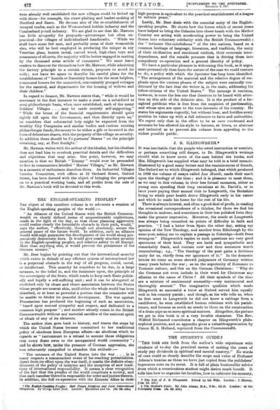J. R. ILLINGWORTH..
IT was inevitable that the people who owed instruction or comfort, or perhaps something still deeper, to Dr. Illingworth's writings should wish to know more of the man behind the books, and Mrs. Illingworth has supplied what may be told in a brief memoir. illustrated by a good many letters and the reminiscences of friends, The Oxford set to which Illingworth belonged, that which produced in 1889 the volume of essays called Lux Mundt, made their mark upon the theology of the time ; and it is pleasant to most them, as see may in this volume, in their leas formal moments, either as young men spending their long vacations at St. David's, or in later years paying -their annual visit to Longworth, the Berkshire living to which poor health drove Illingworth early in his career and which be made his home for the rest of his life.
There is always interest, and often agood deal of profit, in reading the occasional correspondence of a thinker, for there we find his thoughts in undress, and sometimes in their less polished form they make the greater impression. Moreover, the oracle at Longworth was always being consulted on points of difficulty in faith and practice. " I had a letter from Spain the other day, asking my opinion of the New Theology, and another from Edinburgh by the same post, asking me to explain a passage in Coleridge--both from strangers." Illingworth's replies to such questions are very good specimens of their kind. They are lucid and sympathetic and remarkably frank, and contain now and then sentences worth
remembering; "The theology of the past gains a fictitious unity for us, chiefly from our ignorance of it." In the domestic letters we come on some shrewd judgments of Germany written many years before the war ; as on the superiority of Romance to Teutonic oulture, and this on the German Christmas : " Why do the Germans not even include in their word for Christmas any allusion to the name of Christ T All their symbols of the time are a mixture of sentimental sensuality—very sentimental and thoroughly sensual." The imaginative qualities which made Illingworth are successful a tutor at Oxford served him equally well in his country parish ; and though, as his wife tells us, when he first went to Longworth he did not know- a cabbage from a cauliflower, he soon established human relations with his parish- ioners, and became as much an oracle to them on the construction of a drain-pipe as on more lipiritual matters. Altogether, the picture we get in this book is of a very lovable character. The Rev. Wilfrid Richmond contributes a chapter on Illingworth's philo- sophical position, and an appendix gives a valuable appreciation by Canon H. S. Holland, reprinted from the Commonwealth.














































 Previous page
Previous page